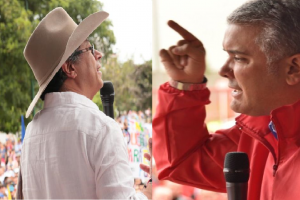
Who will be Colombia’s next President? Gustavo Petro (left) or Iván Duque (right)?
It has been an election of bitterness, barbs and killer bees but today Colombians will have their final say on who the next president will be. The polarised nature of the contest has led to many insults, arguments and heated discussions within the barrios and pueblos of this country, with many divided on the direction of the country and which way it should be headed.
The final choice will be between conservative candidate Iván Duque and leftist candidate Gustavo Petro. It has been a difficult decision for many as the two candidates have offered very different visions for the nation. Duque’s priority will be to build, whereas Petro’s priority will be to balance (particularly as it pertains to inequalities he sees in society). The choice will be over a man who his supporters see as a safe pair of hands and a man known as a political maverick.
So this evening we will know who Colombia’s next president is. We’ll also, however, have the answers to these questions
-
Peace referendum 2.0
Many will see this election as a referendum on the peace accord signed between the government and the FARC in 2016. President Juan Manuel Santos’ key achievement, for which he won a Nobel Peace Prize, will have an unclear future under a Duque presidency given his previous opposition to it and his current distaste for the impunity provisions within the agreement. If the people of Colombia choose Duque, it’s likely to mean that their opinions on the peace agreement remain divided, as they did when the referendum was held in 2016.
2) The question of economy
Gustovo Petro’s signature line on the economy was to base it on agriculture rather than fossil fuels or private enterprise. Duque on the other hand wants to continue building, with aid to companies in a number of sectors, including that of the ‘creative economy’ known as la economia naranja. Which economic proposal will Colombians choose? We’ll know this evening.
3) Behind every man
Despite not making it to the top of the ticket in this race, women have played key supporting roles in this election. From the passionate Green party leader Claudia Lopez who has come out strongly in favour of Gustavo Petro, to the pious Vivane Morales who put her weight behind Duque’s presidential bid, women have had greater visibility in this cycle than ever before. Today we will learn if either Ángela Robledo or former Minister of Defence Marta Lucía Ramirez will be Colombia’s first woman vice president.
4) Anti-Uribe or Anti-Venezuela
When it came to debating this election, supporters would usually rest on one-word arguments to make their case. For Petro supporters that word was ‘Uribe’, in reference to Colombia’s former president in the hope that his years of state aggression towards guerrillas and civilians would be enough to dissuade possible Duque voters.
For Duque supporters on the other hand, that word is ‘Venezuela’. Many Colombians fear that socialist, chavista policies will run the risk of Colombia being turned into their eastern neighbour.
At the heart of Colombia’s politics is that struggle between personal safety over economic security. That personal freedom from violence over the right to a fair standard of living.
In a campaign of boogeymen, we’ll find out which of the anti-Uribe or anti-Venezuela contingents are larger in Colombia.
5) Landslide or Earthquake
Pollsters got the top two results right in the first round, correctly predicting that Duque would win and Petro would be second. The same is true in this runoff with all of the polls predicting a Duque win, some of them even predicting a landslide. Can they be wrong however? Fajardo was able to gain major ground on Petro in the first round which had not been reported by polls and the referendum on the peace record did not predict that the majority of Colombians would reject it.





